posts
 My review of Our Global Families appeared in the January 2016 edition of Evangelical Missions Quarterly and is reposted here with permission. In this new work, Todd Johnson and Cindy Wu offer Christ-followers the tools to understand and engage two families—the Global Body of Christ and the non-Christian, human family. In parts one and two of the book, the two families are introduced and described and the reader benefits from Johnson’s previous work on Global Christian demography—particularly the Global Atlas of Christianity. In part three, Global Christians are exhorted to appreciate the diversity of the Global Church and to truly belong to it, while also pursuing dialogue and common cause initiatives with non-Christians. In the final section, building on the work of others, Johnson and Wu resist the “world changer” language of many evangelical groups and instead propose a humble “faithful presence” approach to being on mission in a globalized world. The authors accomplish a great deal in just under two hundred pages. It is quite impressive that such a large amount of data on Global Christianity and trends could be meaningfully presented for readers with little background on statistics and data. More than a statistics report, the faces and stories of Global Christians and humans are presented in a personal and compassionate way. The practical proposals for hospitality, civil discourse, and meaningful dialogue and deliberate collaboration with peoples of other faith communities are quite convincing and helpful. These ideas are strengthened by personal illustrations from the authors’ lives and ministries. In terms of weaknesses, I do have some concerns in how they define a Christian—“adopting the United Nations’ definition of a Christian as one who self-identifies as such” (p. 5). While evangelicals have surely defined Christianity too narrowly in history along confessional, denominational, or cultural lines (p. 78), global believers must still self-identify according to the gospel of Christ—the good deposit of faith that has been handed down and “believed everywhere by everyone always.” If self-identification is the rubric for authentic Christianity, then how do we evaluate the confessions of Mormons, Jehovah’s Witnesses, or any group that has insufficient beliefs on central teachings of the faith that are inconsistent with Historic and Global Christianity? Second, although Johnson and Wu are writing at an introductory level and raising many subjects, a number of times I was left desiring more in-depth discussions. An entire chapter or section of the book could have been devoted to themes like hospitality, justice, or interfaith dialogue. Perhaps the writers did such a good job of raising the issues that this reader was left wanting more. All said, this book is commendable and I could see it being read in the undergraduate curriculum of intercultural, global, and international studies programs in Christian colleges. Comments are closed.
|
Archives
November 2023
|
 RSS Feed
RSS Feed
